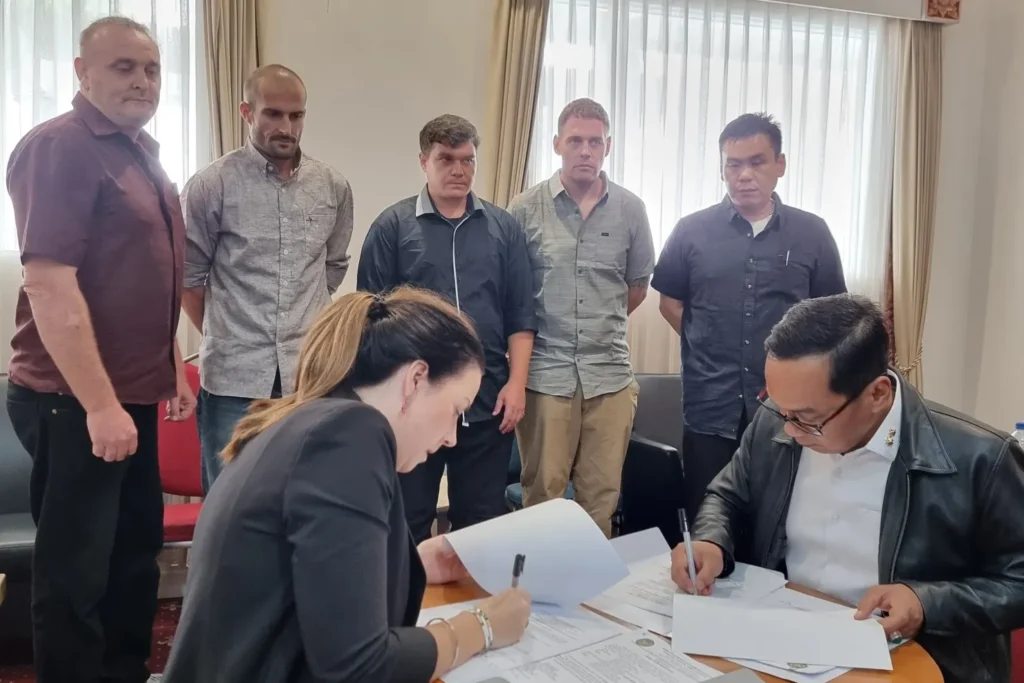The return home of five members of the ‘Bali Nine’ over the weekend marks an extraordinary feat of diplomacy by Prime Mininster Anthony Albanese and Foreign Affairs Minister Penny Wong.
It also follows the return of other Australians incarcerated overseas – albeit for very different reasons – including Cheng Lei, Julian Assange and Sean Turnell.
And the release of the men follows a monumental stuff-up by Australian police more than 19 years ago.
Three of the Bali Nine have died, including two via firing squad after being given the death penalty. Another died of cancer. The others, except Renae Lawrence who was released in 2018, served more than 19 years in an Indonesian prison before being released over the weekend, including two who had barely crossed into legal adulthood at the time of their arrest.
They committed a crime, attempting to smuggle more than 8kg of heroin into Australia. It was a crime that seemed so shockingly stupid and reckless that there was little public support for their cause at the time.
But it was a crime the Australia Federal Police had predicted they would pursue, so much so that they alerted their Indonesian counterparts two weeks before the arrest of the Nine in April 2005. The AFP told these counterparts – knowing that Indonesia does issue the death penalty for drug trafficking – that they believe the nine had flown to Bali to smuggle heroin home. Australian police said that they believed Andrew Chan was the ringleader, and told Indonesian police, “If you suspect Chan and/or the couriers are carrying drugs at the time of their departure, please take whatever action you deem necessary.”
The AFP knew this because Scott Rush’s father, Lee Rush, was so concerned about his then 19-year-old son that he alerted the AFP before Scott flew to Bali.
During a 2006 Australian Story, Lee Rush said he was “speechless” and “sickened” when he received the call from Australian government authorities to learn that his son had been detained in Indonesia. “We tried to lawfully stop our son leaving the country. It wasn’t done,” he said.
The Federal Government is believed to have negotiated for the five men to return to Australia on humanitarian grounds. Originally, when the news broke in November, it was expected that the men may be required to serve time in an Australian prison. However, there were no Australian legal grounds to make that happen.
Albanese raised the cases directly with new Indonesian Prime Mininster Prabowo during an APEC meeting in Peru in November, as he had done with Prabowo’s predecessor Joko Widodo. Elected in March, Prabowo had a different view from his predecessor in being willing to transfer the men home.
The remaining five have returned home, and they did so quietly, unlike the media circus that surrounded Schapelle Corby in 2014 – a move that infuriated the Indonesian public.
These five men should be home. As should Myuran Sukamaran and Andrew Chan, who were shot to death in an Indonesian jungle. Tan Duc Thanh Nguyen, another member of the group may have fared differently in Australia battling stomach cancer, which he succumbed to in May 2018.
Matthew Norman, Michael Czugaj, Scott Rush, Martin Stephens and Si Yi Chen are home, with a statement released on their behalf noting they are “relieved and happy” to be here.
The statement also noted the professional support offered by DFAT over the years, at a senior level and in prison visits and via personal assistance. “The men and the families will always be grateful,” the statement said.
“They look forward, in time, to reintegrating back into and contributing to society.
The statement also noted their welfare as a priority. “They will need time and support, and we hope and trust our media and community will make allowance for this.”
In a statement from Albanese, Wong and Home Affairs Mininster Tony Burke, the “mutual respect between Indonesia and Australia” was acknowledged.
“The Australian Government has consistently advocated for the men and provided consular support to them and their families,” the government statement said.
Albanese also thanked President Prabowo “for his act of compassion.”
“The men will have the opportunity to continue their personal rehabilitation and reintegration in Australia,” he said.
The men will live freely in the community. They have served their time. I hope they find peace and a good life in Australia with the support of family, friends and the community.


